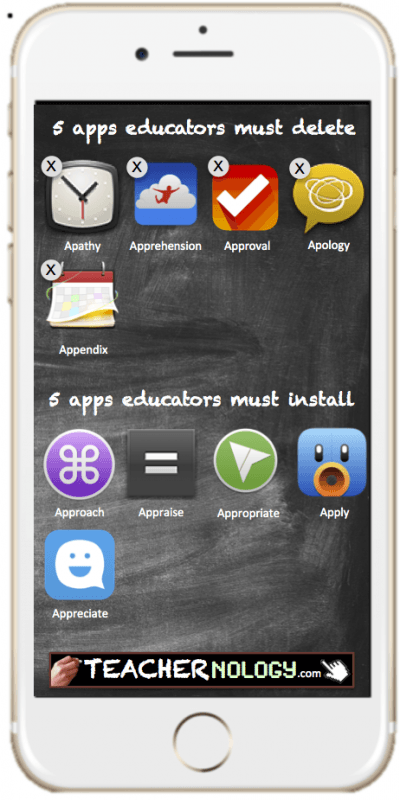The “Apps” Educators Should And Should Never Use
I recently came across an article entitled “5 apps educators should use”, but in my enthusiasm I misread it as “5 apps educators shouldn’t use”. I must admit that I did a double-take for a moment. How could someone tell educators what apps not to use? It would really be bad to be an app on such a list… which of course got me thinking. Are there any apps that educators shouldn’t ever use? I think there are, but maybe not the ones you would expect. Here are 5 “apps” educators should never use plus 5 “apps” every educator must use.
5 “Apps” Educators Should Never Use
- Apathy.
Topping the list of apps that should never be used by educators is apathy. There is no cure for apathy, and no hope for innovation in the classroom. It is understandable, however, how after being stuck in an industrialized system of education that is all about standardization and outputs, that many educators are apathetic. Yet the first thing we must make sure we get rid of is apathy! We must care. We must make a difference. We must act! - Apprehension.
Educators are humans too, even if students don’t always agree. We have hopes and fears, likes and dislikes, and all too often we are apprehensive when it comes to technology. Many educators may themselves have grown up BC (Before Computers) and even though computers are now a norm in our lives, they still feel foreign in the hallowed precincts of our classrooms. We are apprehensive about making mistakes. We are apprehensive about failing. We are apprehensive about what we don’t know. Don’t be! Apprehension is fine, as long as it does not stop us from moving forward. Anything new can be scary, daunting… otherwise it’s not really new. So, accept the apprehension, but don’t let it stop you from moving on to bravely explore strange new worlds… (Star Trek theme music now playing). - Approval.
OK, so we all like approval - we all thrive on validation. However, this is another app that we can’t have in our educator arsenal. You may get approval, but if you are seeking approval for trying new and innovative teaching approaches, you will be sorely disappointed. All too often the innovative educator is out on their own; think Dead Poets Society… Innovative teaching is not approved, and often it’s despised. Your validation will come from your students, from the look in their eyes when learning becomes meaningful. Don’t expect it from management or even other teachers… it’s lonely be an innovator, but the ultimate rewards are worth it. - Apology.
I’m not advocating bad manners, but being apologetic about what you’re trying to do, and your certain-to-arise failures, is to be avoided. I have a saying; “Try beta, you’ll teach better”. The web is built around the beta principle. Everything is in permanent beta, in a permanent state of improving. Google’s famous Gmail was in beta for many years, even with millions of active users. Why? Well, because they were, and still are, ever improving Gmail. There’s no apology for this, it’s how we grow. Trying new approaches will be fraught with failures. Quite simply, if you haven’t failed, you haven’t tried! Rather than apologize and eulogize, scrutinize, then galvanize, and move on to something beta and better. - Appendix.
It’s at the end of the list of apps to delete... Which is where things we append tend to come. And this is exactly what we don’t want in the innovative educators’ app list. Innovating how we teach is not an afterthought; it is not an “end of list” item. It’s no longer a “nice to try if I have time”. We need a revolution in our education, and that means we need to rethink how we are doing everything we do, right NOW. It’s not simply about what we’ve always done with a bit of digital appended to the end. It’s about reimagining, redesigning, redoing how we teach. It’s not appending we need, but leading. It’s not more of the same tacked on the end, its innovating from the front.
So as educators we need to carefully scrutinize our “apps” and make sure we have removed as far as possible from ourselves apathy, apprehension, approval, apology, and appendix. If we cling to any of these our best attempts at revolutionizing our classrooms, at reinventing our teaching, will be destined for failure. Delete these “apps” now! Click and hold them down, and when they wiggle - hit the X to delete.
5 “Apps” Educators Should Always Use
Hey, but surely we need some apps installed in our iTeacher life if we are going to be successful, right? Sure we do. So after removing the previous 5 apps from iTeacher, here are the 5 apps every iTeacher must use!
- Approach.
Quite simply this is where it all starts; with the right approach. The approach of too many teachers to technology use in the classroom is what I call the copy/paste approach. We simply copy what we’ve always done and paste it back into our classroom with a digital coating. It’s much more than books becoming eBooks or blackboards becoming smartboards; it’s about activating our learners through the amazing affordances technology offers to learn through curation, conversation, correcting, creating, and even chaos. - Appraise.
One of the strengths of technology is that is enables us to celebrate diversity - diversity of learning approaches and diversity of teaching strengths. Don’t simply use technology like everyone else does just because that’s what they do. Appraise your learners’ needs and your strengths, and then use technology in a way that will enthuse and enthrall you and your learners once more. Don’t be overwhelmed by the possibilities, rather choose one thing and give it a good try while resisting the desire to leap to the next latest craze. - Appropriate.
This “app” stands as both a verb (to take) and an adjective (what is suitable) - and these are both key in the educators app store. Take what is suitable and discard what isn’t. Shamelessly steal the ideas of other educators. Learn from their experiences. There’s too much to learn, too many apps to try; appropriate what’s appropriate, and you’ll save yourself loads of unnecessary time wastage. If we expect our students to learn from us, shouldn’t we learn from others too? - Apply.
I often end my training sessions with educators with this riddle: “There are three birds on a branch - one decides to fly away, how many birds are left?” We’d assume two… But because I’m asking the question the respondents assume a trick, so I get everything from 0 to 3 as replies. The answer I’m looking for is three. The fact that a bird decides to fly away is not the same as flying away. Deciding to innovate and transform our classrooms, while a great first step, is not the same as transforming and innovating our classrooms. The Apply app is vital if you want to change your classroom. Take a step, however small, you’ll be amazed at how easy it can be. - Appreciate.
We’ve all heard it. “Modern students are too distracted”, “This generation is lazy and overstimulated,” and so on. Sure these observations might be true, but rather than fixate on the symptoms, let’s appreciate the opportunities. Technology may be to blame for the crisis in our classrooms, but maybe it’s a crisis that was long overdue. We’ve taught in a production-based, instruction-led, industrial style since the invention of the printing press. Finally we have new and exciting opportunities to teach in new and exciting ways, brought to us by technology. Celebrate and appreciate the exciting times we are living through as we have the opportunity to teach in classrooms, in the midst of the greatest education revolution we’ve ever seen!
Being an educator in our modern day and age is no easy task. We are living in turbulent but exciting times. When it all just seems too much, just remember - “Don’t worry, be ’appy”!


